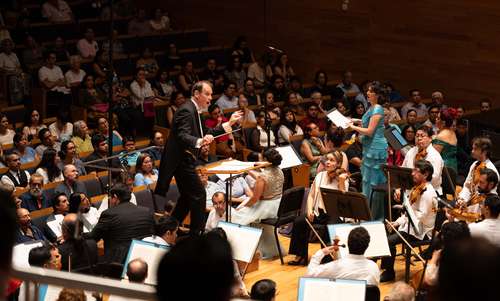Xalapa, Ver., María Gloriosa, voiced by soprano Tania Solís, appeared on the back balcony, on the right side of the stage, dressed in a white dress. From above, when the musical time marked the moment, the choir sang: Come! Ascend to the highest spheres! When he beholds you, he will follow you
.
It was the prelude to the end of the concert of Symphony no. Mahler’s 8, also called Symphony of a thousand, which the Xalapa Symphony Orchestra (OSX) performed this Friday in the Tlaqná room, conducted by Martin Lebel.
The public remained expectant, concentrated. A screen in the background, with the translated texts, allowed us to appreciate the literary beauty of the works. The voice of María Gloriosa was followed by the participation of a choir, and then the intervention of a soloist, and then, another choir, and at the end: the eternal feminine will take us to heaven
.
The work, written by Gustav Mahler in the summer of 1906, revised over three years, was presented this weekend by OSX 23 years after the first time he performed it (in 2001) and after the program had to be canceled. 2020 due to the pandemic.
The expectation that the play caused among the Xalapa community caused some people to leave their homes an hour and a half in advance, in order to be on time for the concert. Others, who did not have tickets because the seats were sold out two days before, showed up outside the Tlaqná hall, to see if they could convince someone to sell them their ticket.
At 8 p.m. on Friday the entrances were closed, and the 350 musicians summoned to perform the symphony were already arranged on the stage, shoulder to shoulder. The conductor and seven of the eight soloists had to enter through a side door, in the middle of the audience, and go up one of the front stairs. They barely found accommodation in the limit that separates them from the public.
With the baton in the air, the choirs of the Universidad Veracruzana (UV), the Camerata Choral of the UV Faculty of Music, of the Higher Institute of Music of the State of Veracruz, the Wahine, the Orfix, and the Sinfónico de la Benemérita Autonomous University of Puebla, joined the musicians of the orchestra to start the first part of the concert that takes the medieval hymn Veni, creator spiritus (Come, creator spirit), attributed to the monk Rabanus Maurus, with words that Mahler changed.
It was a moment of great intensity. In this part of the concert, Martin Lebel was observed in continuous springing, which included a couple of jumps with both feet. He never stopped waving his arms, in such a way that it seemed that the dark tailcoat he chose for the occasion would not hold up and would break at any moment.
After 30 minutes, when the first part of the concert concluded, before the intermission, Lebel – who is white-skinned, but was now red from so much effort – turned around and received applause from the audience.
In the second half, which employs the last scene of part two of Fausto, of Goethe, the chorus of penitents – the great Sinner, the Samaritan Woman, Mary the Egyptian and Margaret – could be seen praising the piety of the Virgin Mary.
Highlighted the presentation of Ecstatic Father in the voice of the Mexican baritone Genaro Sulvarán, who, to fill his chest with air and intone: ineffable pain, divine happiness
had to stand on tiptoe, at the edge of the stage, at the risk of falling at any moment.
But it was the last two minutes and 17 seconds, after the appearance of María Gloriosa, that left the audience absorbed, when the choirs and soloists joined the OSX, to sing the mystical chorus: the eternal feminine will take us to heaven
which was followed by eight hits of the cymbal to close the concert.
After a downward movement of Lebel’s baton, the audience heard the silence at the end of the work, and stood up to applaud for 10 minutes each choir and group of instruments that make up the OSX, and that participated in the historic performance. The symphony. 8 by Gustav Mahler.
